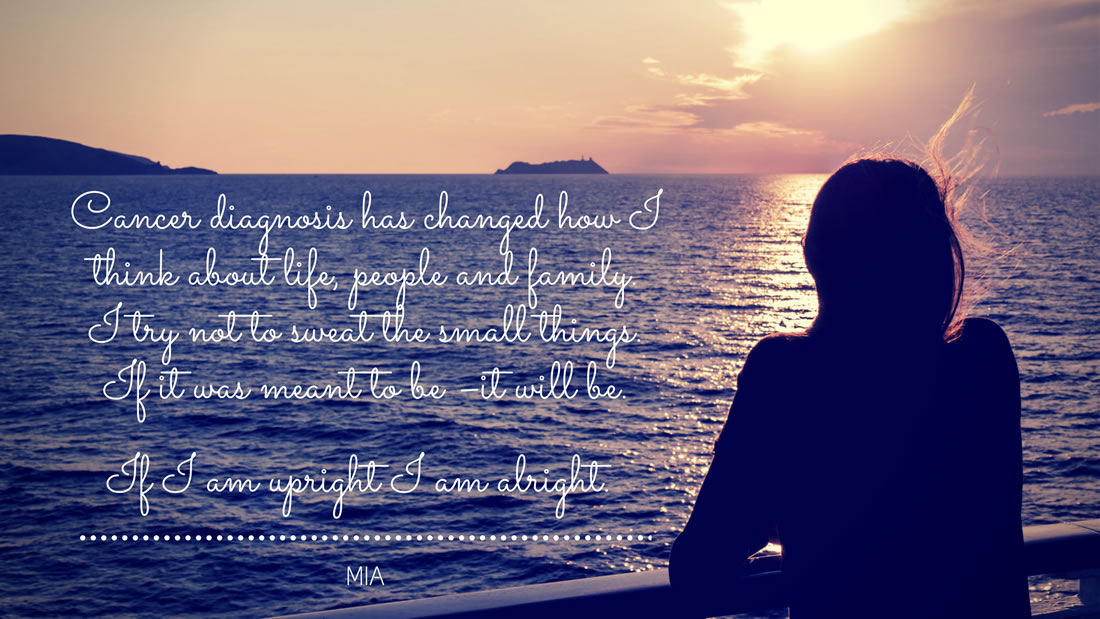We need to talk – I have vaginal cancer [Mia's story]
“We need to talk – I have vaginal cancer.” These were words Mia never imagined she’d say. It was February 2015 and Mia had just been diagnosed. Two years on, she’s sharing her story about cancer and lymphoedema in the hope it will make a difference to other women.
Cancer? In my pink bits? Well, that knocked the smile off my dial. I felt so alone. While there is plenty of support and understanding about breast cancer, gynaecological cancer is another story. Thankfully the support network is growing and the Choices team put me in touch with other women to talk with.
The diagnosis and the changes cancer made to my body sometimes make me feel very frustrated, sore at times and a bit cranky. But I am upright and all right and FOC (^#%* off cancer) I am here to stay. Unlike my friend, Chris, who was diagnosed with endometrial cancer (stage 4) after my diagnosis. Sadly, she is no longer here.
My journey started with multiple abnormal pap smears in my early thirties, resulting in a hysterectomy in 2000. I continued to have vaginal vault smears and after an abnormal one, my gynaecologist sent me to Dr Jim Nicklin. With a result of VAIN II/III, I was booked for surgery and in January 2015 I had a partial vaginectomy. The operation went well but the results came back with vaginal cancer (stage 1). In February 2015, I had another partial vaginectomy, bilateral oophorectomy and removal of pelvic lymph nodes, which was all done laparoscopically. Thanks Jim, I can still wear a bikini at nearly 60 if I wanted to! There was no need for chemo and radiotherapy. I think I’m a lucky recipient of LACE trial research results.
Lymphoedema (fluid retention and tissue swelling) is commonly caused by the removal of lymph nodes as part of cancer treatment. Legs and arms are a common place to get lymphoedema, but the pelvis and genitals are not! How do you get compression on your tummy and pink bits? In October 2015, I started intensive therapy for lymphoedema and contacted Medical Accessories, a supplier of compression stockings. Together we worked on some custom-made abdominal compression gear. It may not be a sexy look but it’s helping me get my body back. As well as this, I do my own massage, bandaging and compressing every day. I swim, walk, watch my weight, do yoga, have a healthy diet and drink plenty of water.
I consider myself lucky to have had such an early diagnosis of cancer. It has changed the way I think about life, people and family. I try not to sweat the small things. If I am upright, I am all right. Plus I have a great team in my corner – specialists, GPs, an amazing husband, family and friends. Along the way, I have shared the journey with anyone who is interested. I hope it will help someone. I even show people my great compression gear to help them understand. Ask questions. Have regular checks. It’s your body and you know how it works and how it feels. Any abnormal lumps, bumps, pain, bleeding, unexplained tiredness – go to your doctor. In amongst the busy-ness of life, some of us, like my kind dear generous friend Chris, forget to look after ourselves. Please look after yourself.
This blog was abbreviated from a speech that Mia gave recently at a Cherish Women’s Cancer Foundation breakfast for Battle Ambassadors. For a copy of her full speech please contact us at l.harrold1@uq.edu.au. If you, or someone you love, has recently been diagnosed with gynaecological cancer, you can access a range of support services through Choices.
For more information about gynaecological cancer research fundraising event The Battle 2017, visit Cherish’s website or email info@cherish.org.au.

